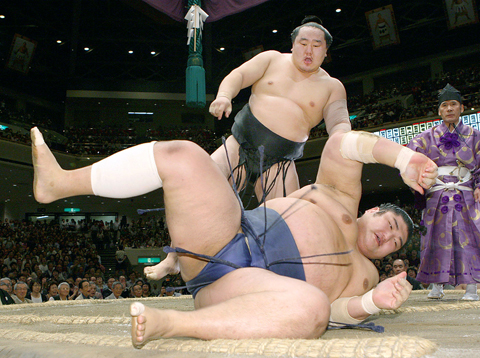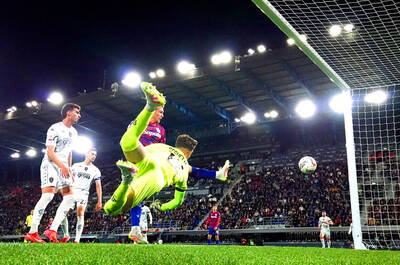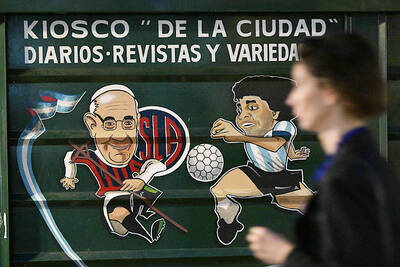Japan’s police chief has vowed to smash the murky links between sumo and yakuza organized crime after a widening scandal over illegal gambling led to the arrest of a former wrestler.
The biggest scandal to tarnish Japan’s ancient national sport in years has led big-name sponsors to pull out millions and put in doubt whether national broadcaster NHK will show the summer tournament next month.
Governing body the Japan Sumo Association has said 29 unnamed wrestlers had admitted to illegal gambling, although media reported that 36 others also had bet on cards, baseball, golf and other pursuits.

PHOTO: AFP
As investigators seek to untangle the links between the big boys of sumo and the bad boys of the Japanese mafia, police on Thursday arrested a former wrestler, Mitsutomo Furuichi, 38, on extortion charges.
Furuichi, who reportedly told police that he is a former gangster, allegedly demanded hush money from a sumo wrestler who had been involved in widespread gambling on baseball matches and other sports.
“He is suspected of blackmailing the victim ... and received ¥3.5 million [US$39,000] in cash,” a police spokesman said.
Media reported the victim of the extortion attempt was wrestler Kotomitsuki — ranked second only to the yokozuna, or grand champion.
“We have to clean yakuza crime links out of the sumo world,” National Police Agency chief Takaharu Ando said after the latest news to tarnish the sport that has been at the heart of Japanese culture for 2,000 years.
Those links became apparent last month when sumo officials were disciplined after it emerged that they had given ring-side seats at a sumo tournament to top bosses of the Yamaguchi-gumi, Japan’s largest crime group.
Because NHK broadcasts of tournaments are shown in Japan’s prisons, the ring-side seats allowed crime bosses to send a silent message of support to their members doing time behind bars, commentators said.
The sumo association censured those who made the tickets available to the gangsters — but the case highlighted connections between two of Japan’s most macho and mystery-shrouded institutions.
Sumo, based on ancient Shinto rituals, puts its wrestlers through punishing workouts and an austere and strictly hierarchical lifestyle in the isolation of their “sumo stables.”
Once populated by tough country boys, and increasingly by foreign-born wrestlers, it is a world of 3am roll calls and grueling workouts where only the toughest fighters last to reach the top.
About 90 percent of stables have allowed beatings of trainees and punishments such as forcing salt or sand into their mouths, the sumo association has said.
Many Japanese were shocked by the 2007 case of a stable master who ordered the “hazing” of a 17-year-old wrestler who died after being beaten with a beer bottle and a baseball bat. The stable master was jailed.
While sumo is a tough and cloistered world of male athletes, the true bad boys of Japan have long been the yakuza, whose heavily tattooed gangsters have spawned numerous movies, manga comics and fanzines.
The yakuza, who trace their roots to samurai gone astray during the 17th-century Edo period, traditionally relied on gambling, prostitution, loan-sharking and protection rackets as their bread and butter.
In recent decades they have turned to money laundering, deposit fraud, cybercrime and extorting huge sums from blue-chip companies by threatening to show up at their shareholder meetings.
They have operated relatively openly, entertaining close ties with politicians, and police have tolerated their existence as long as they have stayed on their turf and kept down street crime.
Amazingly for outsiders, yakuza groups themselves are not illegal and openly operate from large corporate headquarters.
Japanese organized crime counts about 82,600 members, according to the National Police Agency — nearly half of them with the Kobe-based Yamaguchi-gumi, dubbed the “Wal-Mart of crime syndicates.”

Bologna on Thursday advanced past Empoli to reach their first Coppa Italia final in more than half a century. Thijs Dallinga’s 87th-minute header earned Bologna a 2-1 win and his side advanced 5-1 on aggregate. Giovanni Fabbian opened the scoring for Bologna with a header seven minutes in. Then Viktor Kovalenko equalized for Empoli in the 30th minute by turning in a rebound to finish off a counterattack. Bologna won the first leg 3-0. In the May 14 final in Rome, Bologna are to face AC Milan, who eliminated city rivals Inter 4-1 on aggregate following a 3-0 win on Wednesday. Bologna last reached the

If the Wild finally break through and win their first playoff series in a decade, Minnesota’s top line likely will be the reason. They were all over the Golden Knights through the first two games of their NHL Western Conference quarter-finals series, which was 1-1 going back to Minnesota for Game 3 today. The Wild tied the series with a 5-2 win on Tuesday. Matt Boldy had three goals and an assist in the first two games, while Kirill Kaprizov produced two goals and three assists. Joel Eriksson Ek, who centers the line, has yet to get on the scoresheet. “I think the biggest

From a commemorative jersey to a stadium in his name, Argentine soccer organizers are planning a slew of tributes to their late “Captain” Pope Francis, eulogized as the ultimate team player. Tributes to the Argentine pontiff, a lifelong lover of the game, who died on Monday at the age of 88, have been peppered with soccer metaphors in his homeland. “Francisco. What a player,” the Argentine Football Federation (AFA) said, describing the first pope from Latin America and the southern hemisphere as a generational talent who “never hogged the ball” and who showed the world “the importance of having an Argentine captain,

Noelvi Marte on Sunday had seven RBIs and hit his first career grand slam with a drive off infielder Jorge Mateo, while Austin Wynn had a career-high six RBIs as the Cincinnati Reds scored their most runs in 26 years in a 24-2 rout of the Baltimore Orioles. Marte finished with five hits, including his eighth-inning homer off Mateo. Wynn hit a three-run homer in the ninth off catcher Gary Sanchez. Cincinnati scored its most runs since a 24-12 win against the Colorado Rockies on May 19, 1999, and finished with 25 hits. Baltimore allowed its most runs since a 30-3 loss to